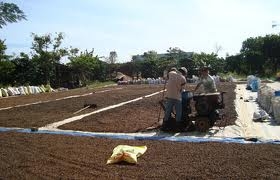PPP yet to deliver tasty fruit
 In mid 2011, Thai Hoa Group Joint Stock Company came up with a public-private partnership (PPP) model in growing coffee in Lam Dong, Quang Tri, Son La and Dien Bien provinces. By that time, the company expected the PPP project could bring breakthroughs in local coffee production, creating a stepping stone to form a successful coffee production chain.
In mid 2011, Thai Hoa Group Joint Stock Company came up with a public-private partnership (PPP) model in growing coffee in Lam Dong, Quang Tri, Son La and Dien Bien provinces. By that time, the company expected the PPP project could bring breakthroughs in local coffee production, creating a stepping stone to form a successful coffee production chain.
The model, however, failed after a half year’s implementation with farmers turning their backs on the project. Thai Hoa incurred losses of VND120 billion ($5.7 million) from the project in 2011.
Another PPP coffee growing project handled by Nestle Vietnam in association with some foreign firms including Yara, Syngenta, BASF, Bayer, EDE Consulting, Cisco and some others, however, is faring well.
The project, with support from an international non-governmental organisation, takes place in Central Highlands’ Dak Nong province with around $24 million in investment and attracting 17,250 farmers.
“The project is evolving so quickly,” said Nestle Vietnam’s external relations head Vu Quoc Tuan.
“Our PPP project involves businesses in diverse areas like fertiliser, pesticide and trade. Farmers get from us fertiliser, pesticide, production techniques and the promise to buy end products, a crucial factor to attract farmers,” said Tuan.
Nestle Vietnam’s PPP project success partly came from the fact that the project was planned scientifically from sourcing capital, training staff and farmers to setting responsibilities for businesses and farmers. Violators, either firms or farmers, would incur a penalty or even face filling in court procedures.
In fact, PPP projects’ success and failure mainly relies on firms’ capacity and policy frameworks. Firms argued the current PPP state regulations did not cover PPP in agriculture.
For instance, in the prime minister’s draft decision on corporate income tax incentives to companies having cooperation contracts with the state, firms signing contracts with farmers benefit from incentives, while the draft does not mention groups of companies doing the same thing.
When investment capital comes into agriculture has trended downward, PPP is expected to unblock capital channel into this field. In fact, PPP projects into agriculture are resuming quick pace with five PPP taskforces currently in place and active support from 14 multinational groups in Vietnam.
“Vietnam is viewed as rich in PPP agriculture. However, the game is not only for multinational groups but also for local companies,” said head of the Institute of Policy and Strategy for Agriculture and Rural Development Dang Kim Son.
“With current five PPP taskforces and one about to take shape there will be more PPP projects in agricultural sector in the coming period,” Son asserted.
What the stars mean:
★ Poor ★ ★ Promising ★★★ Good ★★★★ Very good ★★★★★ Exceptional
Related Contents
Latest News
More News
- Hermes joins Long Thanh cargo terminal development (February 04, 2026 | 15:59)
- SCG enhances production and distribution in Vietnam (February 04, 2026 | 08:00)
- UNIVACCO strengthens Asia expansion with Vietnam facility (February 03, 2026 | 08:00)
- Cai Mep Ha Port project wins approval with $1.95bn investment (February 02, 2026 | 16:17)
- Repositioning Vietnam in Asia’s manufacturing race (February 02, 2026 | 16:00)
- Manufacturing growth remains solid in early 2026 (February 02, 2026 | 15:28)
- Navigating venture capital trends across the continent (February 02, 2026 | 14:00)
- Motivations to achieve high growth (February 02, 2026 | 11:00)
- Capacity and regulations among British areas of expertise in IFCs (February 02, 2026 | 09:09)
- Transition underway in German investment across Vietnam (February 02, 2026 | 08:00)

 Tag:
Tag:




















 Mobile Version
Mobile Version